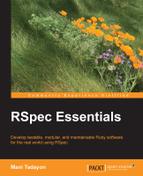In this chapter, we'll see how RSpec's examples and matchers implement the general testing concepts of units and assertions. An example is the base unit for a set of RSpec specs and, within it, you must have a matcher to assert something, otherwise it would serve no purpose.
In this chapter, we will cover the following topics:
- Structure of a spec file
- RSpec output
- Matchers
- The
lethelper - Testing for errors
Let's look again at the AddressValidator module we introduced in Chapter 1, Exploring Testability from Unit Tests to Behavior-Driven Development, so we can understand its structure better. We'll also use some basic RSpec features to improve the tests. Let's look at the spec code:
require 'rspec'
require_relative 'address_validator'
describe AddressValidator do
it "returns false for incomplete address" do
address = { street: "123 Any Street", city: "Anytown" }
expect(
AddressValidator.valid?(address)
).to eq(false)
end
it "missing_parts returns an array of missing required parts" do
address = { street: "123 Any Street", city: "Anytown" }
expect(
AddressValidator.missing_parts(address)
).to eq([:region, :postal_code, :country])
end
endWe defined a local variable address in each example. This is fine for simple, one-off values. We could get the same functionality shared across multiple tests with a local function defined within the scope:
describe AddressValidator do
def address
{ street: "123 Any Street", city: "Anytown" }
end
it "returns false for incomplete address" do
expect(AddressValidator.valid?(address)).to eq(false)
end
it "missing_parts returns an array of missing required parts" do
expect(
AddressValidator.missing_parts(address)
).to eq([:region, :postal_code, :country])
end
endIf the same value is used in more than one test, an instance variable in a before block can be used:
describe AddressValidator do
# this block replaces the 'address' method
before do
@address = { street: "123 Any Street", city: "Anytown" }
end
it "valid? returns false for incomplete address" do
expect(
AddressValidator.valid?(@address)
).to eq(false)
end
it "missing_parts returns an array of missing required parts" do
expect(
AddressValidator.missing_parts(@address)
).to eq([:region, :postal_code, :country])
end
endIn many cases, the object needs to change slightly from one test case to another. Local variables, local functions, or instance variables are tedious and make it hard to see the differences between test cases. For example, if we wanted to test for invalid characters in a city name, we would have the following:
describe AddressValidator do
before do
@address = { street: "123 Any Street", city: "Anytown" }
end
it "valid? returns false for incomplete address" do
expect(AddressValidator.valid?(@address)).to eq(false)
end
it "missing_parts returns an array of missing required parts" do
expect(
AddressValidator.missing_parts(@address)
).to eq([:region, :postal_code, :country])
end
context "invalid characters in value" do
before do
# notice the value for :city includes special characters
@address = { street: "123 Any Street", city: "Any$town%" }
end
it "invalid_parts returns keys with invalid values" do
expect(
AddressValidator.invalid_parts(@address)
).to eq([:city])
end
end
end